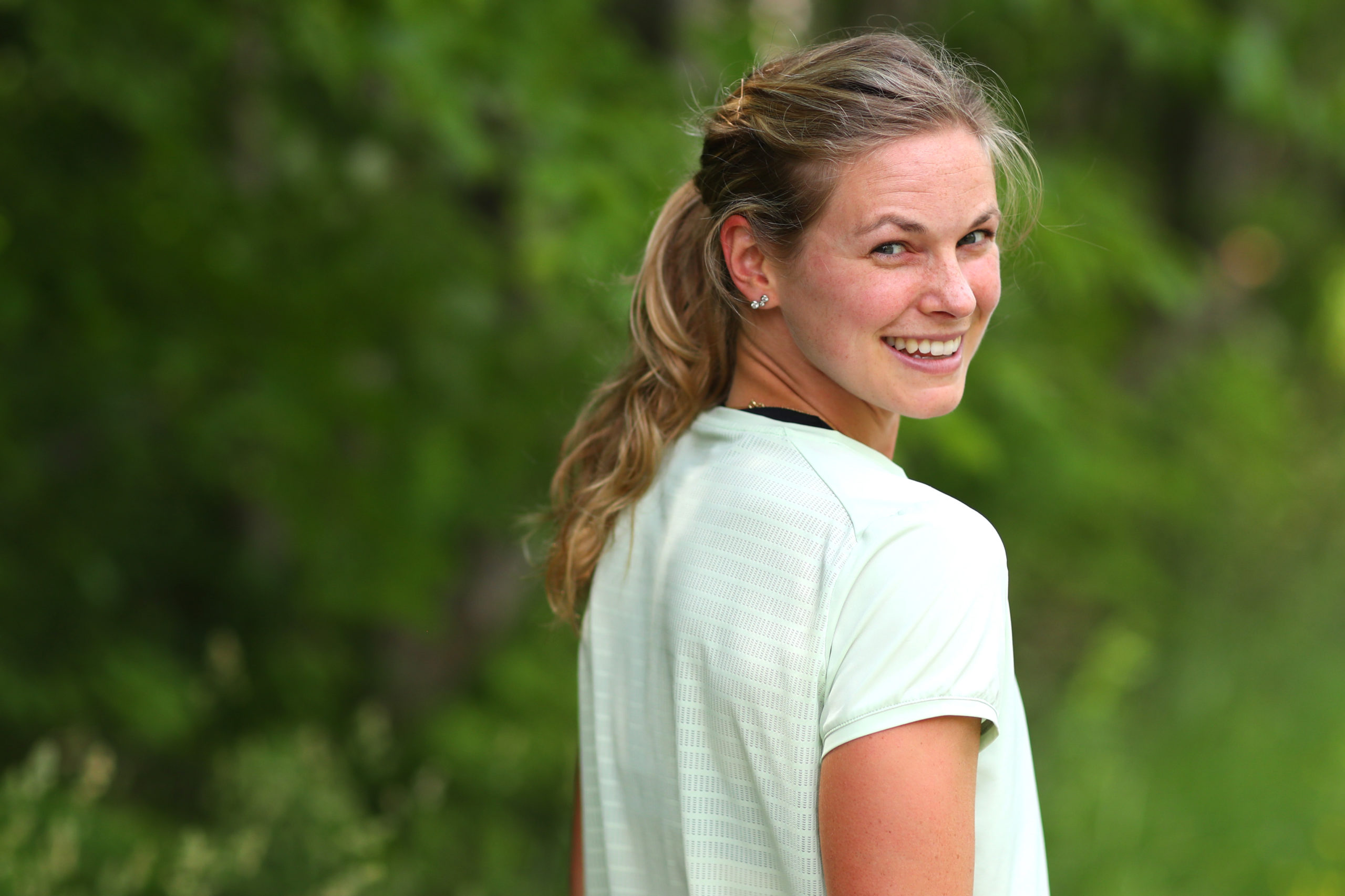I’d like to set the tone and intention for this post right from the start, because it’s important to me that you know why I feel the need to write this. I’m strongly of the opinion that your life should not potentially end in order to achieve success in sport. There used to be a time in my life when I thought “meh, I don’t really care that much if I’m able to have kids someday, as long as I can ski fast”. It’s hard to see the big picture when your brain isn’t finished developing yet, but it’s also hard to see the big picture when you’re in the middle of an eating disorder. However. The day I stopped thinking that and started to take care of my body is precisely why I found success in sport. You’ve got to love the irony.
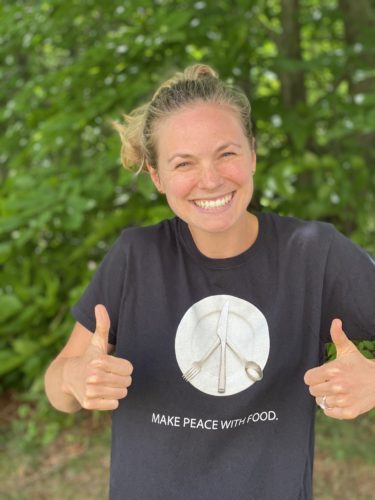
Food can be a happy thing, one that brings great memories back as well! Food can be an occasion to gather families together, to celebrate. There’s a reason we have wedding and birthday cakes, for example! My earliest memories of learning to cook was sitting up on the counter, peeling and mashing bananas to make banana bread with my Dad. Now when I’m on the road and making banana bread as a snack for my teammates and myself, I have those warm happy memories. So in this blog series you will hear me focus on how to try and create a healthy team environment, how to approach the tough talks, how to fuel for success and how to be supportive. You will NOT hear me say anything about the sacrifices you “just have to make as an athlete”, or how if you want to be the best you need to be a little bit hungry all the time, because, quite frankly, I think that’s a bunch of crap. Healthy, happy and balanced athletes are the ones that make it across the finish line again and again throughout a long career and leave a legacy.
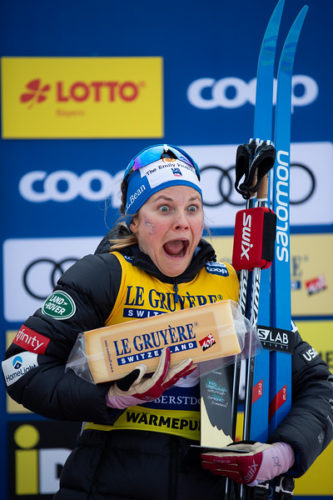
I’d like to sincerely thank you all for the questions, comments and thoughtful prompts that came flooding in! After I asked what you’d like to talk about when it comes to fueling, body image and eating disorders in sport, I realized that:
- 1.) this is harder to write about than I’d realized, and
- 2.) it warrants a two-part series.
This post, part one, is going to tackle the more emotional-support side of fueling in sport. Because if it was as simple as “eat this and you’ll be fine”, we wouldn’t even be talking about it, would we?
Part two will take on more of the how’s and why’s of eating; I’ll walk you through my own experience and why I do what I do, how I build a plate of food after training, and what performance fueling looks like for me.
The reason, perhaps, why so many of us are worried, unsure and sometimes a little scared about eating around sport is that disordered eating is so prevalent. Let me make this clear: you do not have to have an eating disorder to be using disordered eating habits. They’re incredibly common.

After reading some stats from the National Eating Disorder Association (NEDA)’s website, it’s pretty clear that this is something many athletes – and their support team – struggle with.
“In a survey of athletic trainers working with female collegiate athletes, only 27% felt confident identifying an athlete with an eating disorder. Despite this, 91% of athletic trainers reported dealing with an athlete with an eating disorder.”
“Though most athletes with eating disorders are female, male athletes are also at risk—especially those competing in sports that tend to emphasize diet, appearance, size and weight. In weight-class sports (wrestling, rowing, horseracing) and aesthetic sports (bodybuilding, gymnastics, swimming, diving) about 33% of male athletes are affected. In female athletes in weight class and aesthetic sports, disordered eating occurs at estimates of up to 62%.”
“Among female college athletes surveyed, 25.5% had subclinical eating disorder symptoms.”
I think it’s so important to note that HUNDREDS of you have messaged me about this, yet the nature of disordered eating or body shame is that it can be isolating and make us feel alone. Even if you are struggling, remember that you are not the only one. Statistically speaking, most of you reading this right now will have struggled with disordered eating at some point. That’s not your fault. It’s also not your fault if you feel anxiety around food or don’t love your body every day; it’s called being human. But that doesn’t mean we should stop working on cultivating as positive and healthy a relationship between ourselves and our bodies as possible, right?
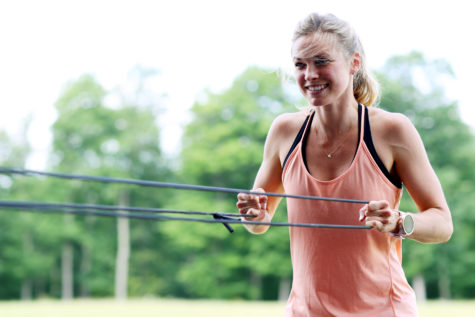
Before I get into your awesome questions, I want to put out a disclaimer that I’m not an expert. I’ve gone through a lot of this myself, and I feel comfortable talking about it, but I’m not a professional! It would take an incredible amount of arrogance to assume that my own experiences should shape yours. So take my Q&A for what it’s worth; one person’s advice based on their experience, and use it as a thought prompter, a conversation-starter, a way of remembering to check in with yourself. If you or someone you know has an eating disorder (or thinks they might have one), the first thing you should do is reach out for professional help. A few quick links to get you started down that recovery path:
The National Eating Disorders Association (NEDA) website: https://www.nationaleatingdisorders.org/
A tool for finding help for eating disorders local to you: https://www.findedhelp.com
The Emily Program website: https://emilyprogram.com/
I can personally speak to the Emily Program as a treatment option that both worked for me and saved my life, and I’m proud to be an ambassador for them now.
I also wrote a blog on how to support someone going through an eating disorder, with a lot of links for finding help, this past winter. You can reference that here:
Now let’s get into it! Many of these questions around how to foster a healthy, safe and productive training environment on a team were similar. Kudos to all you thoughtful people asking about how to support your teammates, your athletes from a coaching perspective, or your kids from a parental perspective! I’ve combined a few questions, but made a few distinctions where I feel that they deserve a markedly different response.
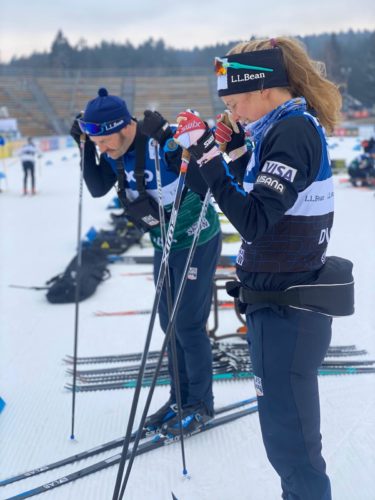
Question: What are the best ways for a coach to encourage and create a healthy dialog around fueling and eating enough? What if it’s male to female dynamic? How do you approach the topic with an athlete you think may be struggling with food?
In general, I feel that one of the best approaches you can take as a friend, teammate, parent or coach is to remember to let the athlete tell you how they feel, in their own words. Lead with open-ended questions, not assumptions or statements, that prompt the athlete’s own feelings to come out. For example, let’s envision a scenario where the athlete just finished a time trial.
Please don’t come in with something like “Nice! You just got a PR! I noticed you’ve lost weight; you’re looking really fit. You must feel pretty good about today!”
Here’s what I struggle with in that instance, even thought it was clearly meant to be a positive and encouraging comment. There’s no such thing as “looking fit”. Fitness doesn’t have a “look”. What you mean is that they look lean, but that’s only one small factor out of many that comprise an athlete’s performance. They may have gotten a new PR, but it may also not be making them happy. By emphasizing their body shape and connecting it to their time, you’re putting weight at a higher value than technique, training, recovery and mental strength. And, if you say this in front of other athletes, it could be really damaging to them. Last but not least, the time on the clock may not reflect how they feel about their performance, and by assuming how the athlete feels because of the time, you are unknowingly negating the other aspects of performance that athletes are working on. I’ve had races with relatively poor results that I was immensely proud of because of how I raced, and races that I’ve won where I feel that I could have improved my technique, tactics or focus.
But if you come in with “You got a PR! How did you feel about today’s time trial? What were you working on?”
By letting the athlete state their own opinion on their effort, their feelings about the day and talk through the goals they had for the session, they’re taking some control and ownership of the time trial. It becomes about more than the time, and it’s not about their body shape at all – it’s about a bigger picture.
And it’s totally ok to give positive feedback and compliments! Just try to make them about the things the athlete has direct control over, not the genetics and body shape they were born with. Comments like: “great focus”, “great hustle!” “I like how you showed up to practice with goals in mind for this workout” or “wow, you made a technique breakthrough today” can be so uplifting and empowering. As a teammate, I try to give sincere compliments on my teammate’s work ethic, technique progress, sportsmanship and team presence when I see them occur. Building your teammate’s confidence with sincere remarks about their effort, not their bodies, is a great way to foster that healthy culture where athletes feel confident in what they’re doing and know they’re on the right track.
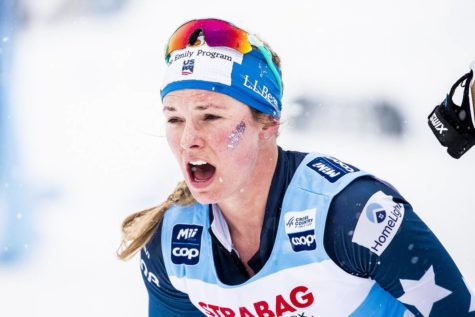
So let’s get back to the unsolicited body comments for a moment. This is, in my unprofessional opinion, a big area where parents, coaches and teammates can help create a safer and healthier space.
Do not make comments about an athlete’s weight. Any comments. At any size. Just don’t. I’m not just making this up, either; out of the thousands of incredibly important things coaches and teammates have done to help me achieve a lifelong goal of Olympic Gold, you know the one thing nobody did? Comment on my weight, encourage me to lose weight, or comment on the bodies of athletes who were beating me (or behind me). It’s just not necessary.
Things that WERE necessary:
- -developing strong sports psychology skills and mental toughness through a sports psych plan
- -improving my technique (dis was a BIG ONE)
- -video review
- -a training plan that was adjusted to my body, my stress and my physiology
- -creating training camps where I could be challenged and pushed by other athletes
- -creating a safe and caring environment
- -organizing logistics around traveling the World Cup for 5 months
- -talking over race tactics and strategy
- -keeping me company on long training sessions
- -a great strength coach writing a plan tailored for me and my body’s needs
- -a dietician making sure I got enough iron, vitamin C and figured out how to fuel enough during travel and training
You get the idea. Out of all the components of what makes me perform as an athlete, weight is such a small factor at the end of the day that it doesn’t even make the list. It’s not worth stressing about. And yet. Because it’s so much easier to measure and obsess over in a sport without concrete items to measure because snow speed and ski speed constantly changes, we tend to focus in on it.
At the end of the day, when it comes to making a comment about an athlete’s body, ask yourself first: What is the point? What do they have to gain from this? What could they possibly lose from me making this comment? Do I need to say this to them? Usually, the answer is nope, not necessary.
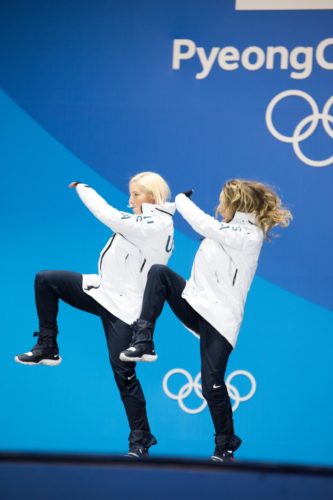
Now that I’ve said that, I’m going to contradict myself. If you start to notice warning signs in one of your athletes (losing a significant amount of weight, drop in energy, not acting like their usual self, taking longer to recover), then it might be time to say something. And this is where it gets really tricky.
What has worked for me, personally, is a coach leading with “I care about you, and I want you to know that I’m 100% supportive of your goals as an athlete. Which is why I’d like to talk to you, because I’d like to see you achieve all your goals throughout a long and healthy career, and right now, I’m concerned about you. How are things going? Is there anything you’d like to talk about?”
From there, refer them to an eating disorder specialist, help them make the appointment and let them know that you’re really, really proud of them for taking steps to protect their mental and physical health. Remember, they may not have a clinically diagnosable eating disorder, but that may not mean they’re not using disordered eating. In the words of the National Eating Disorder Association: “Early detection increases the likelihood of successful treatment; left untreated the problem may progress to an eating disorder.”
Here’s the best analogy I’ve got: If an athlete comes up to you and says “I think I have skin cancer”, you are not expected to treat them as if you’re a doctor. You can be there for them, support them, and refer them to a specialist in that field. With an eating disorder, I see this in the same light. You’re not expected to know how to “fix it”, but you can refer them to a professional treatment center or eating disorder specialist, and/or a registered dietician. In my opinion as an athlete, your role as coach is to keep an eye out for your athletes and have the courage to speak to them if you notice that something may be amiss. If they are struggling with something (this includes eating disorders, but it could also be problems at home, bullying, school stress) you can let them know you have their back, and ask how you can be supportive at practice. Sometimes just knowing that your coach understands that you’re going through a rough time and is ok with you taking a step back in intensity at practice goes a long way. Essentially, this is your chance as a coach or teammate to say “I may not understand, but I care about you, and I’m here for you”. It may not always feel like you’re helping, but having officially opened the door to any conversations down the road can be a huge first step.

NEDA, the National eating disorder association, has a really awesome page on coaches and steps you can take if you are concerned about an athlete, linked here: https://www.nationaleatingdisorders.org/learn/help/coaches-trainers
One organization I am proud to be an ambassador for is WithAll, with their “What to Say” program for coaches (you’ve probably heard me talk about this before, because I think it’s so important). I’ve got a whole blog post for you about this, so I’m just going to link it here for you!
So what ARE positive action items we can take to create that healthy dialogue? One approach I’ve heard that I think is really proactive and smart is to start the season off with a team chat about healthy fueling for sport. Get that conversation out in the open, as a natural part of being in sport. A natural part of LIFE, by the way. Ya gotta eat! It can get intimidating and confusing sometimes, especially living in part of the world where diet culture is so prevalent and it feels like every other year you’re “supposed” to avoid different foods altogether. So get the record straight – you need to eat in order to train and recover, and this doesn’t have to feel scary if you feel like you’ve got some knowledge on your side.
This may look different depending on the age group you’re coaching; when you’re younger, it’s about having a snack after practice to help you grow those muscles that you’ve worked hard for! As you get older, more competitive and more serious, it turns from “eat, drink, dry clothes” right after practice to remembering to fuel with adequate carbs long enough before a race that you can digest them and have energy available for your race. In part 2 of this blog series I’ll go into examples of how I tackle fueling in my own training, and why I do it that way. But you don’t have to be an expert on sport nutrition to open this talk – bring in someone who does feel comfortable with that area and let them lead the team talk (and be there to let your athletes know you’re in this with them, and there to support them in their goals).
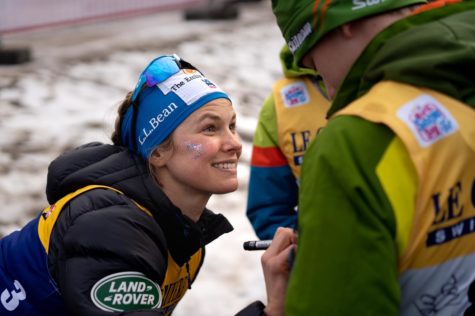
This can be especially intimidating if you’re a male coach working with young female athletes. There needs to be trust built and in place for a young girl to tell her male coach that she’s struggling with eating, and even then, I personally found this too hard to openly talk about. So what can you do? Make sure your athletes know that they can talk to you, but also provide a secondary contact who is another gender, if possible. An example I’ve seen of this being done really well is a male University coach letting his athletes know at the start of the season that he will not judge them for anything they need to talk about with him. He then introduces the school’s dietician, who happens to be female, as another point of contact that the athletes can use as a resource if they don’t feel like taking with the coach for any reason. Will this system always work? Possibly not, but at least you’re giving your athletes multiple people to approach and resources at hand to use in the event that they need someone to talk to.
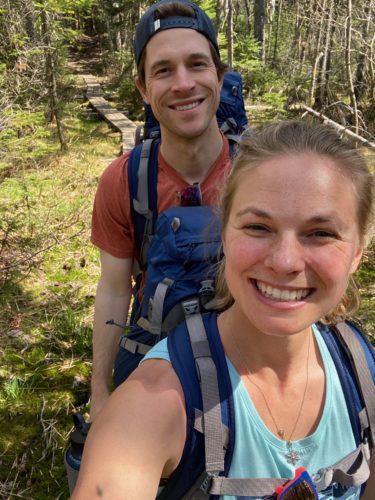
Question: How can teammates best support a teammate who may be struggling with healthy eating?
Help build their confidence with sincere compliments on the things they’re doing well (not related to body or size, but effort, teamwork, focus) and make sure they know you’re there to support them. Similar to the coach, you’re not in charge of fixing their eating disorder, but you are in a great position to encourage them to get professional help, and be supportive of their recovery path.
The other best thing you can do is model a healthy food relationship yourself. It’s really easy (sometimes) to see when someone else is struggling, but it’s hard to point that out and help them if you yourself are not in a healthy relationship with food and your body. I’m not saying you have to overeat in order to encourage them to eat, but make sure that you’re not making the contradiction of encouraging a teammate to fuel while never eating during long training sessions and only ever drinking water in your own drink belt. Make sure that your words as you talk about yourself reflect kindness and compassion. If you want your teammates to like who they are and feel confident in their bodies, be sure that you’re showing that respect to yourself as well, not making self-deprecating comments about “losing weight before the big time trial” or “I’m too fat for this hill climb!”.
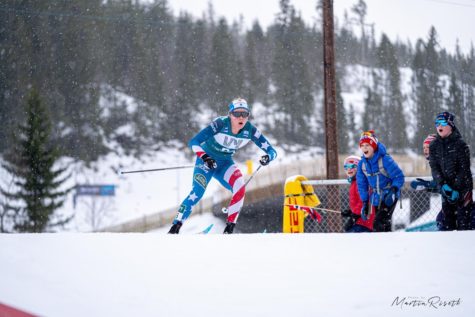
Question: Could you elaborate on how you view the difference between “discipline” and “disorder”? My human girl is a runner, used to run competitively and during that time she overcame anorexia…but a lot of the women who she trained with justified calorie-restricted diets in the name of “fitness”.
Question: As a pro athlete, you have to push your body to extreme measures. How and when do you know that your eating is extreme to match the (valid) intensity vs an honest eating disorder? it seems with athletes in particular that line gets too often blurred and therefore left uncaught.
These are great questions, because when we look around us in the world, it appears that many people are using disordered eating and passing it off as many different things. How then do we know if and when we have a problem, when our own habits are simply mirroring those around us? (this is why it’s so important to model a healthy relationship to food as a parent or teammate, because you can be a great role model this way!)
There can be athletes that don’t officially have an eating disorder that are still using disordered eating habits. This is still harmful, and has the potential to develop into a clinically diagnosable eating disorder (at least, mine did, and it was plenty harmful).
In my opinion? You don’t need “food discipline” in order to become a successful athlete. Sure, you do need to follow your body’s cues, listen to it when it tells you it’s hungry and when it’s full, eat a variety of foods and follow some pretty basic sports nutrition, but I would put that in a different category than what many refer to as an athlete’s disciplined food diet. Many people assume that they can never eat sugar, dessert, or fat in order to go fast. I think if you feel that you cannot ever eat certain foods, that you cannot eat even if you are hungry, that you can’t trust your body’s hunger cues because it must be lying to you, or that fast athletes can’t ever eat dessert, that’s trending in the direction of disordered eating. So if you feel that this describes you, this is a great opportunity to look for professional help or consult a dietician. The earlier you can address these thoughts and habits, the sooner you can avoid REDS (relative energy deficiency syndrome) caused by a lack of available energy from not eating enough in comparison to what your body is burning through.
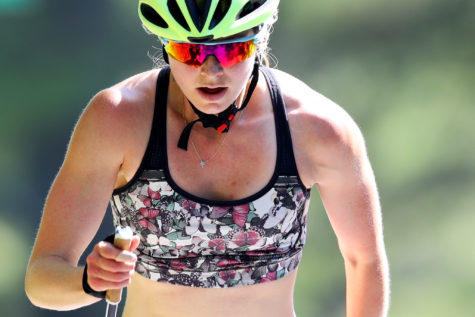
Question: How do you deal with body dysmorphia as a young athlete, when you have to watch videos of yourself skiing for technique purposes on a regular basis, and this brings out insecurities? How would you help someone with a distorted body image who identifies as much bigger than they are?
Body dysmorphic disorder is partly described by Mayo clinic as “a mental health disorder in which you can’t stop thinking about one or more perceived defects or flaws in your appearance — a flaw that appears minor or can’t be seen by others.” And while it may seem real to you, or something you are really insecure about, try to remember that this is minor to other people. If this is something that you’re chronically struggling with, that affects you often, it’s a good idea to turn to a professional for help! This is a real mental health disorder, and it requires real treatment. The Emily Program and National Eating Disorder Association both have a screening tool to help you determine if it’s time to get professional help: https://www.nationaleatingdisorders.org/screening-tool https://www.emilyprogram.com/your-recovery/take-the-quiz/
If this isn’t something that happens often at all, but still really bothers you when it happens on a more minor level (as it should if your brain is playing tricks on you and hurting your self-confidence!), let me level with you about something. Sometimes, I still have days when I look in the mirror and somehow, magically, it appears to my eyes that I’m a much bigger person than I was when I went to bed the night before. Logically, I know it’s impossible to have gained 15 pounds overnight. But my eyes and my brain are telling me a different story, and I have to use my brain to override that icky feeling that starts creeping up on me. This may be a remnant of having had an eating disorder, or this may be something every person on the planet has experienced but doesn’t like to talk about – I’m not sure. But I do know that when I let my brain say “this is an illusion”, I see the real me soon enough. And I’m pretty sure I don’t have a magical Harry Potter type mirror in my room, so it really IS all in my head. I figure if my brain is creative enough to change my vision of myself, it must also be strong enough to override it and come back to normal.

Question: Lots of athletes are trying to build muscle while losing fat – yet this is hard to go about while properly fueling yourself. What is your advice?
It’s hard to answer this question without getting sport-specific and age-specific. Sport-specific, because different sports have different requirements when it comes to strength, power, muscular endurance and speed. Age-specific, because if you’re a 12 year old it’s more important to have fun and enjoy sport vs. if you are a professional athlete. But for me, personally? I think you need to be adequately fueled for the training you need to do in order to improve in your sport. If you eat a balanced diet and are training hard and smart, generally speaking, your body will adjust and get to a place where you have built up muscles for your sport and your body composition is in a healthy place. I tend to think that being well-trained, well-prepared and ready to go on race day is more important than worrying about how much body fat you have, and that it’s not worth risking your energy and training efficiency in order to have slightly lower body fat. If you’re in sport to try and perform your best, and not in sport only for the aesthetics, then I’d say to focus on training hard and smart and trust that with all that training, your body will adjust on its own. At the end of the day, if you have really sport-specific goals and are worried about trusting your body, then it’s time to work with a dietician and let them help build you a plan that you trust and can feel good about!
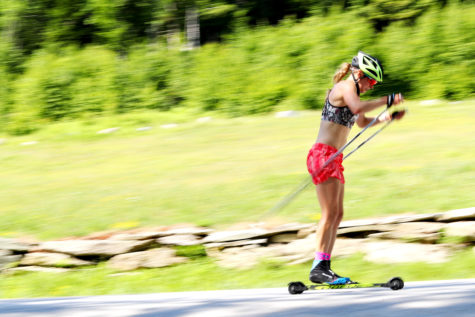
Question: I know I need to be healthy to be a good athlete, but it’s hard when I’m with my friends who aren’t athletes and they eat much less than I do.
This is something I used to struggle with, too, so I feel your pain. It can make you feel self-conscious to be the person at the table eating more than everyone else. But think of it this way: your body needs more than anyone else there. If you’ve got a team practice you’re going to later that day, you owe it to yourself and your team to have the energy you need to do your best, right? It’s not only ok, but GREAT, that you are eating that food you need to feel energized and have focus for your day. So don’t compare what you need to what your friend’s plates look like, because the rest of your day doesn’t look like theirs, either. And your friends will understand and support you, because they want you to succeed, too (if they don’t, drop em)!
Question: How do you learn to get lean for race season in a healthy way after dealing with an ED? How do I trust my body?
For me, it was about first being healthy, not worrying at all about being any sort of shape. The main goal was to save my career (and my life, now that I think of it) by making sure I regained a healthy relationship to food and to eating before, during, and after training.
The biggest thing here, as you mentioned, is trust. And it wasn’t easy, I promise! It took me a long, suspicious-filled period of time before I learned to really trust that my body cues wouldn’t lie to me. If I felt hungry, I should eat. If I felt full, I could stop. And I could (and should) eat during long training sessions and always have drink mix in my water bottle instead of water (more on this to come in part 2 of the blog series, don’t worry!) and I wouldn’t immediately get fat. My body went through some adjustments, but eventually it settled in on it’s own into what I like to call it’s “healthy sweet spot”, where it naturally wants to be when I’m training hard, fueling well and racing fast. There’s a zone where my body genetically likes to be at where I don’t get sick much at all, I don’t get injuries, and I can kick ass in training and recover well. If I try to push my body out of this happy space, it fights back. I get sick. I start to get hurt. I start to get slow. Everything sucks! So what I’ve learned over the years is to simply sit back and let my body be where it wants to be, while I fight the more important battles: the mental toughness training, the actual training, the pacing, the tactics, the technique, the homesickness of being on the road.
My body doesn’t look like anyone else’s on the circuit. And it doesn’t race like anyone else’s, either. I shouldn’t waste time trying to fit into a space it doesn’t want me to be in, because then I might lose the best parts of what makes me fast. So the long answer to your question is this: I really try not to worry about being lean in the winter. I just worry about being fast, and let my body look the way it looks after months of training and racing and fueling with all the food it asks me for. Is this always easy? Of course not. Do I sometimes wish it looked different? Yes, absolutely. But do I think about my body when I’m standing up on top of the podium? No. Those negative thoughts have to right to stand up there with me, because they’re not what got me up there.
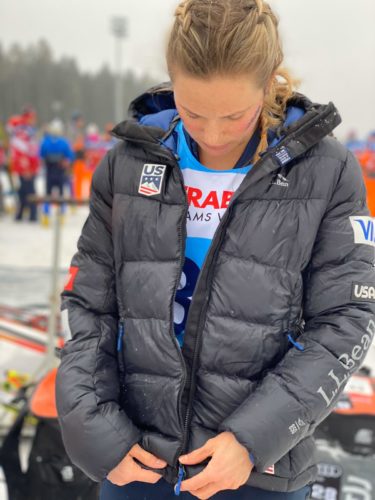
Question: I coach some that feel they need to burn off all the calories that they have eaten and this is motivation for training and over training. Training then becomes a weapon of weight control rather than a process of increasing speed, endurance and strength. How do we get the right conversation around food, weight and using food to care for our bodies?
Similarly to how I answered the first question, I’d make sure you equip your athletes with knowledge of how to properly fuel by either bringing in someone to do a sports nutrition talk, or consulting with someone before talking to your athletes yourself. Make sure they know that you need to eat during training, to adequately refuel after training and to have energy available in order to be successful in sport.
Then, ask each athlete to write down their goals for the season. What do they want to accomplish? And how will they do that? After writing down the process-oriented goals for how they will reach their big dreams, ask them to imagine how food plays into that. If they need to do intervals and strength training twice a week to be strong and fast in sport, how might nutrition help them achieve this end goal? If they understand that food is helping them achieve their goals and is, in fact, absolutely crucial in absorbing any of the training they’re sweating through, they need to eat. Understanding how food was critical in making my training effective and lasting was helpful for me in my recovery process.
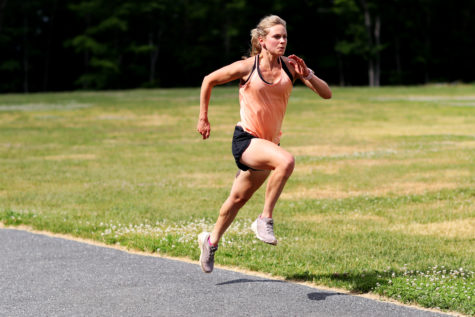
Hey, readers! You get a gold star for making it to the bottom of this post! In closing, I’d like to leave you with a thought from one of the best athletes currently competing: Simone Biles.
“No matter how good you are in your sport, in life, in work, the number one thing people talk about is how you look.”
“They focused on my hair. They focused on how big my legs were. But God made me this way. And I feel like if I didn’t have these legs or these calves, I wouldn’t be able to tumble as high as I can and have all these moves named after me.”
-Simone Biles
I imagine this might happen to men as well, but if you are a woman in sport right now, there will always be moments when you are sincerely trying to SAY SOMETHING or do something, and people will focus in on how they think you look instead. This will be frustrating. It will not seem fair. And you will wonder sometimes: if you were a man, would more of the questions focus in on your strengths in sport, your tactics, your hard-earned preparation for each race?
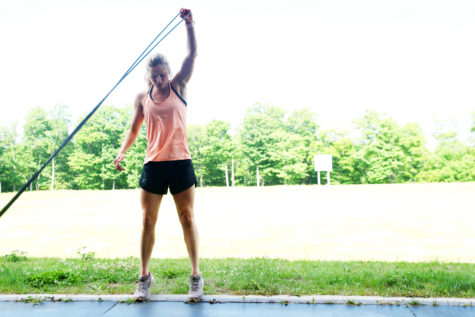
Coaches, teammates, parents: we have a chance to change this narrative from how we look to how we act, what we bring to the team, how hard we hustle. Keep the door open when athletes need to ask for help, and keep the conversation open as well. Let’s keep bringing the praise and attention to the meaningful actionable items, because it’s going to help this culture shift in the right direction!
Athletes, keep trusting your bodies, take care of them, and don’t be scared to reach out for help whenever you need it. Don’t listen to people who keep bringing the conversation back to how you look. You’re stronger than that, and you’re already working incredibly hard at your sport. Don’t let fighting against your body take any energy away from fighting for your goals.
Stay tuned for Part 2 of this series: the actual eating part.

